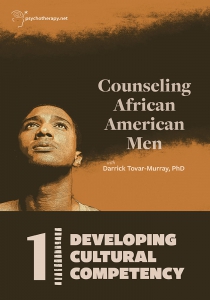The need for multiculturally competent school counselors is more apparent in light of the racial injustice occurring in 2020 and the Black Lives Matter movement (BLM). Black men experience systemic oppression, racism, and racial disparities that result in negative emotional side effects (Carter, 2007). In coordination with Dr. Darrick Tovar-Murray of DePaul University, Psychotherapy.net has developed this timely continuing education video series course to help counselors and counselors-in-training effectively work with African American men. This video series provides a comprehensive overview of issues that impact and shape the world view of African American men, such as racism, microaggressions, identity issues, collective and intergenerational trauma, and mistrust of professionals.
Dr. Tovar-Murray demonstrates the role of the therapist during counseling sessions to help viewers understand how to use culturally responsive counseling skills to broach and explore experiences that shape African American men in the United States. One strength of the series is the counseling sessions, which include real live sessions with three African American men and discussion both during and after each session to provide clarity and insight to the viewers. The dialog between Dr. Tovar-Murray and Psychotherapy.net founder and CEO Dr. Victor Yalom provides a form of debriefing and deeper discussion about the counseling scenes. Viewers can see the progression of sessions to gain a comprehensive understanding of how treatment with African American men would flow. Another strength of the series is the ability to identify and address the challenges that African American men face through an empathetic lens that guides the therapeutic process. Dr. Tovar-Murray does an excellent job weaving in the many intersecting identities that African American men may embrace. There are three volumes in the series that focus specifically on intersecting identities and the range of emotions attached to being an African American man.
Counselors will benefit from the combination of live sessions with commentary and the extensive accompanying resources, including a transcript of each session, role play exercises, and handouts on topical related issues such as microaggressions and code-switching. Dr. Tovar-Murray provides skill-building exercises and discussion questions to enhance cultural competency and the ability to create safe spaces for African American male clients. All of the virtual and written materials work in tandem to allow viewers the opportunity to practice their skills and debrief each activity. This three-volume series and its accompanying resources would be beneficial for counselor educators to integrate into their training of counseling students learning counseling skills and building self-efficacy as culturally competent counselors. Counselor educators can integrate the videos and the exercises with students to provide culturally relevant role-plays and increase dialogue and discussion around each skill.
The series illuminates the need for cultural competence that aligns with the Multicultural Social Justice Counseling Competencies (MSJCC, Ratts et al., 2016). Understanding and recognizing the oppressive systems that impact African American men is fundamental to a social justice orientation. The sessions that address racism provide an opportunity for counselors to learn through observation and increase awareness as opposed to placing the work on African American clients to educate the counselor. Viewers may be surprised to learn the levels of conflict and confusion that are addressed in topics such as “Walking Around in a Black Body,” “The Good Enough Self,” “Protectors and Providers,” and “Feeling Lost.” Dr. Tovar-Murray moves beyond common stereotypes of African Americans and moves into deeper unseen and lesser-known issues that African Americans face.
One minor limitation of this video series is the lack of concentration around the topic of homosexuality among African American men. Viewers would benefit from a deeper understanding of the stigma in the African American community that individuals in the LGBTQ community carry and how it adversely affects their mental health. Overall, there are many benefits to viewing the series Counseling African American Men. Viewers will walk away with a deeper understanding of how to treat and sit with African American male clients in a safe and respectful manner. This video series is highly recommended for counselors, counselors-in-training, and counselor educators.
Psychotherapy.net. (Producer). (2021). Counseling African American men, Volume 1: Developing cultural competency. (Available on video streaming from https://academy.psychotherapy.net/store/bCuqW5vo)
Reviewed by: Jan Gay, NCC, LICSW, Doctoral Candidate, University of Florida
The Professional Counselor
References
Carter, R. T. (2007). Racism and psychological and emotional injury: Recognizing and assessing race-based traumatic stress. The Counseling Psychologist, 35(1), 13–105. https://doi.org/10.1177/0011000006292033
Ratts, M. J., Singh, A. A., Nassar‐McMillan, S., Butler, S. K., & McCullough, J. R. (2016). Multicultural and Social Justice Counseling Competencies: Guidelines for the counseling profession. Journal of Multicultural Counseling and Development, 44(1), 28–48. https://doi.org/10.1002/jmcd.12035

